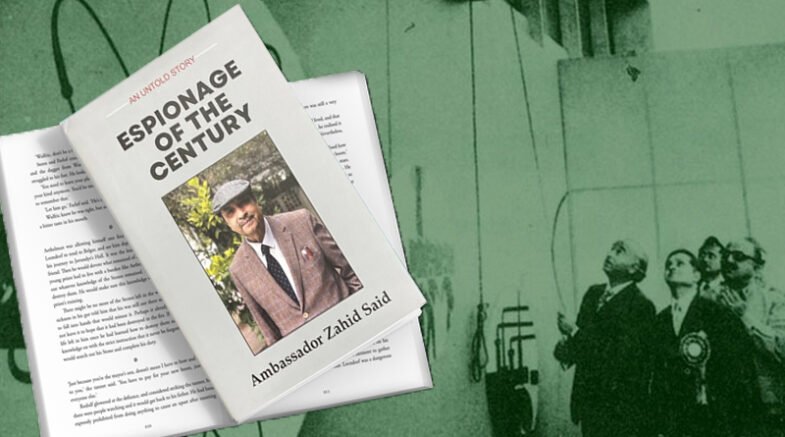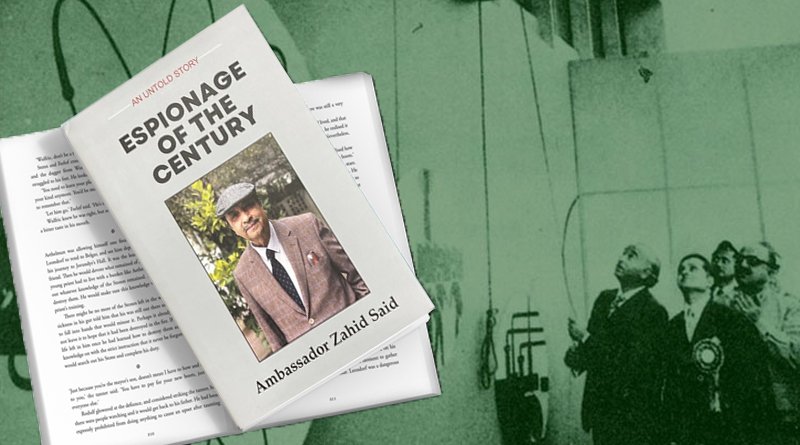Ambassador Zahid Said makes it clear, without sugarcoating it, that those in charge have the power to strengthen or weaken a country’s sense of identity through their actions.

The book “Espionage of the Century” by Ambassador (R) Zahid Said (1938–2020), a truthful account of the events that led to Pakistan’s nuclear journey from the beginning to its successful completion, is now available at bookstalls.
In spite of its 281 pages and 17 chapters, Sang-e-Meel Publications‘ book “Espionage of the Century” manages to keep readers interested because both its content and the author’s candid writing style appeal to them.
Ambassador Zahid Said makes it clear, without sugarcoating it, that those in charge have the power to strengthen or weaken a country’s sense of identity through their actions.
The book is actually a thorough account of events written by a Pakhtun nationalist who comes from the affluent Charsadda family and attended prestigious universities like Cambridge University and Islamia College Peshawar for his education.
The most captivating chapter of “Espionage of the Century” is “The Hague, The Netherlands,” where Ambassador Zahid Said gives a vivid account of his meetings with Dr. AQ Khan, the mastermind behind Pakistan’s nuclear programme, and the circumstances that led to him joining his plan.
They were both posted to the Netherlands at the beginning of 1974, by chance. In the author’s words, “The Smiling Buddha,” as it was formally known by the Indian government, presented Pakistan with a new challenge on May 18, 1974.
They claimed that they had carried out a peaceful nuclear explosion and would not use their capability to produce nuclear weapons in order to quell international outrage and avoid sanctions.”
Dr. Munir Ahmed, the chairman of the Pakistan Energy Commission (PAEC), spoke to senior officials from the Ministry of Foreign Affairs and Pakistan’s ambassadors at the ministry’s headquarters in Islamabad shortly after the Indian nuclear test.
Referencing India’s growing nuclear threat, he assured Prime Minister Zulfikar Ali Bhutto that Pakistan was determined to obtain nuclear technology and weapons in order to counter India. Following the meeting, Ambassador Zahid Said travelled back to The Netherlands, the nation where he was posted as Counselor.
By chance, a young Pakistani scientist named Dr. Abdul Qadeer Khan was also in the nation conducting research for a study on the ultra-centrifuge enrichment facility built by a coalition of three governments, including the UK, Germany, and France.
At The Hague in the middle of December 1974, Dr. Abdul Qadeer Khan approached the author and brought up Pakistan’s need for enriched uranium technology.
Although it might be dangerous, the author decided to give it a try. The conclusion of their conversation was that India’s claim of peaceful nuclear technology was a ruse and that the Pakistani government had the right to develop nuclear capability given the current situation.
Dr. Khan asked Ambassador Zahid to send some documents and other materials to Islamabad via diplomatic bag, as Dr. Munir, the chairman of the PAEC, had requested. After some hesitation, Zahid Said consented to receiving the massive cache of papers and metal centrifuge parts to be transported covertly and undetected by the local authorities to Pakistan.
The author transports the items from Dr. Khan’s home to his office building, where they were left to sit in the garage for a few days. The details of the events and difficulties that followed are described in detail.
It was a serious risk, and even a small leak could have ruined the diplomatic relations with the Netherlands. When he told his boss, Agha Shahi, the then-secretary of foreign affairs, about his decision to assist Dr. Khan (which was actually a help to his nation and country), the writer claims that Agha Shahi was furious to learn how a junior officer of the Pakistani mission could dare act independently without taking the Foreign Office into confidence.
As a result, Zahid Said was given the order to dump the material along a seashore. He made the opposite decision, though, and safely delivered the documents to another Pakistani diplomat.
